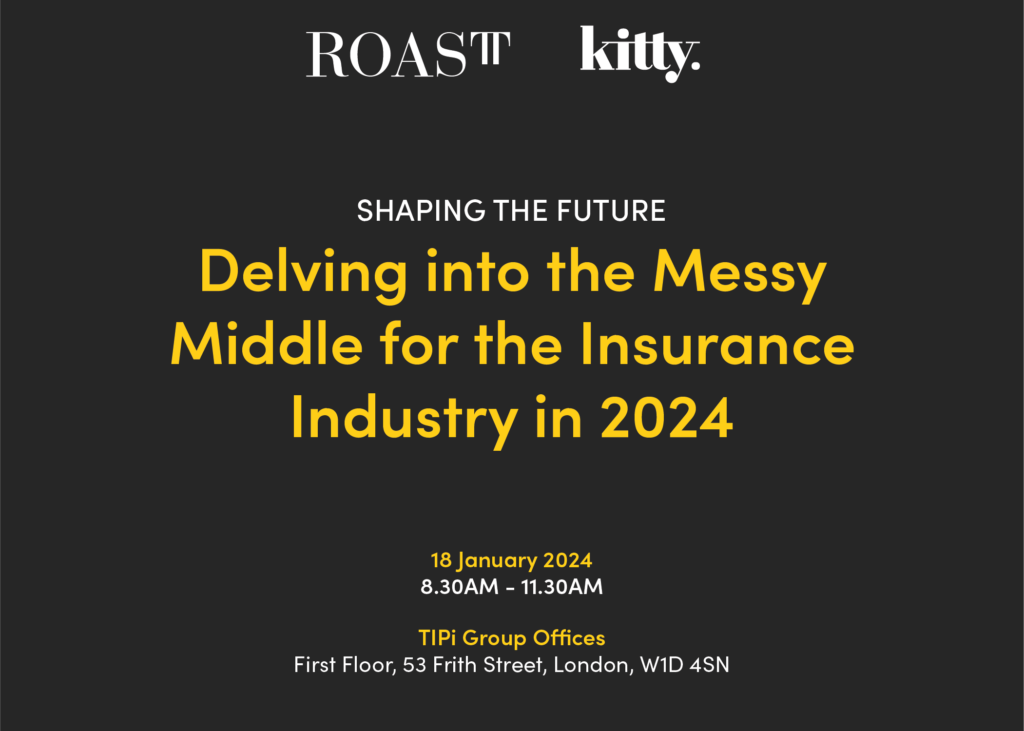
Stars in their eyes? The Science of Online Reviews and How Brands Should Use Them
The Rise of Reviews
The first online reviews appeared in 1999 and were contained to specific seller websites like eBay. Since then, the increasingly competitive digital landscape has driven the widespread adoption of reviews, and now they are an essential touchpoint for consumers looking to differentiate between products, brands, or services.
Within the framework of Behavioural Economics, reviews influence consumers by tapping into two of the better-known cognitive biases: Social Proof and Authority Bias. We mention these biases a lot when talking to clients about building brand trust, but how can we define them?
- Social proof describes the tendency to copy the behaviour and actions of other people in situations of ambiguity or uncertainty. The internet has digitised word-of-mouth reviews and recommendations, making it much easier for people to rely on social proof as a shortcut for decision-making.
- Authority bias describes the tendency to alter our opinions or behaviours to match those of someone we consider to be an authority on a subject. When we’re unsure, we tend to follow the lead of people we believe to be credible and knowledgeable experts and therefore may use an authority view as a mental shortcut.
Source: Google: Decoding Decisions – Making Sense of the Messy Middle, 2020
The Influence of Reviews on Consumer Decision-Making
In the words of leading online reviews platform Trustpilot, reviews help consumers “gather a true idea about companies before parting with their money” and as a result, good reviews increase the likelihood of purchase.
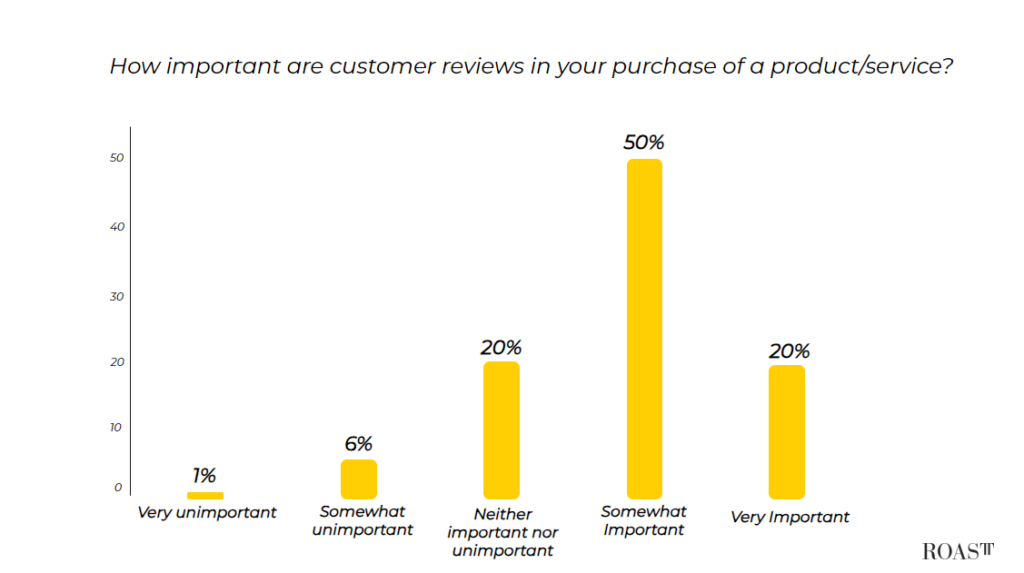
Source: GWI September 2023 Zeitgeist, UK, Importance of Reviews, Number of Responses: 1,964
Reviews are a key consumer touchpoint, especially for higher-value purchases such as electronics or hotels. GWI data shows that 70% of UK consumers would consider reviews somewhat or very important when purchasing a product or service.
Google emphasises the importance of reviews in their latest report on ‘Marketing in the Messy Middle’, which identifies the critical areas of the purchase journey where social proof plays a key role as the ‘research phase’ and the ‘confidence-building stage’. The power of reviews was proved in this paper, with Google’s extensive research showing that ‘social proof was the strongest behavioural science principle’.
Unravelling the Most Influential Review Types
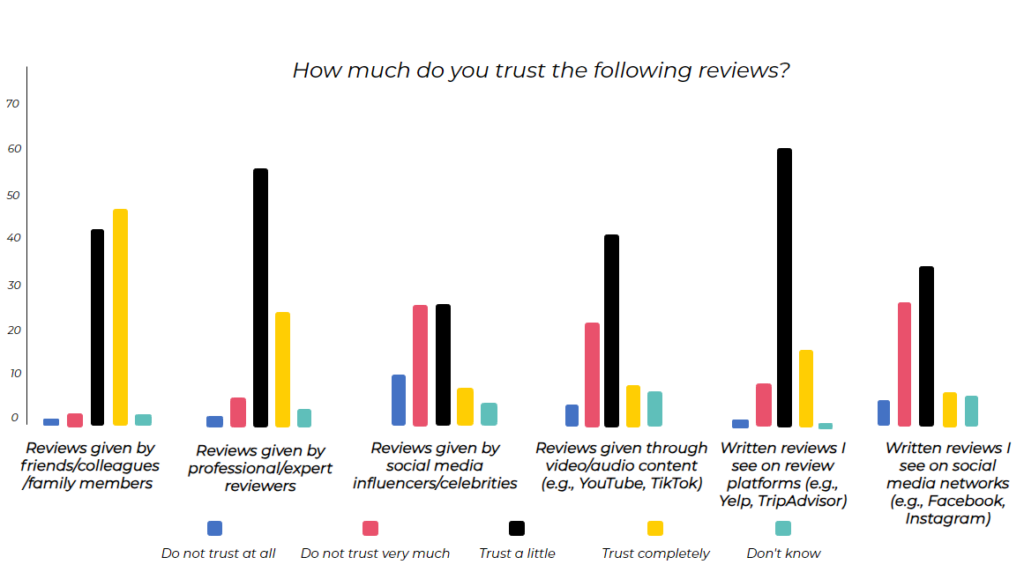
Source: GWI September 2023 Zeitgeist, UK, Level of Trust in Reviews, Number of Responses: 1,964
Not all types of reviews are equally influential. Almost 50% of consumers trust reviews from their family/friends/colleagues completely while the majority of consumers say they only trust reviews given by professional/expert reviewers a ‘little’. Martin Lewis is a great example of a trusted expert reviewer. His no-nonsense approach, which prioritises consumer interests, without payment from brands, means consumers frequently seek out his opinion. A look at Google Suggested Search illustrates the variety of purchase decisions consumers will seek his opinion on.
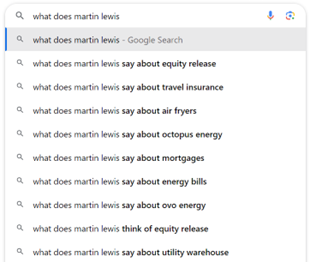
Written reviews on social media are the least trusted review-type and the second least trusted are reviews by influencers. Social media influencing has increasingly faced criticism as regulators have clamped down, with Kim Kardashian notably being fined $1.2million USD by the US SEC when she failed to disclose that she was getting paid to mention EthereumMax on social media posts.
Brands cannot magically put a reassuring review from a user’s best friend or parent in front of them, but brands can leverage some tactics to help make their online reviews as trusted as word-of-mouth recommendations:
- Transparent review policies can build confidence in the authenticity of reviews.
- Verified customer reviews reassure customers that your reviews are from genuine sources.
- Mix positive and negative reviews to show that your brand is open to feedback and doesn’t censor negative opinions.
- Responding to reviews will demonstrate commitment to customer satisfaction and accountability.
- Featuring real names and locations, if possible, will humanise the reviews and add an extra layer of credibility.
Case Study: Octopus Energy
Fast-growing energy company Octopus Energy are avid users of Social Proof and Authority Bias in their advertising creative.
Their current OOH campaign showcases quotes from 5-star consumer reviews sourced from Trustpilot as well as their six ‘Which Recommended’ badges and a tagline of ‘The only Which? Recommended Energy Supplier’.
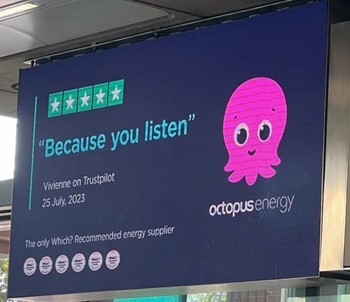
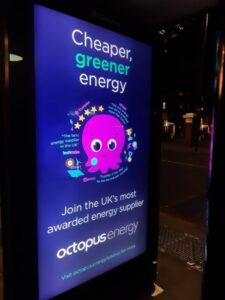
Sources: Frances Benson on LinkedIn and Octopus website
Previous Octopus Energy campaigns have seen them use the call-to-action of ‘Join the UK’s most awarded energy supplier’. Their commitment to portraying themselves as consumer-champions has helped them gain market-share through the cost-of-living crisis.
Getting Creative with Reviews
Reviews are brilliant for building trust, but brands have also leaned on them to showcase creativity and a sense of humour.
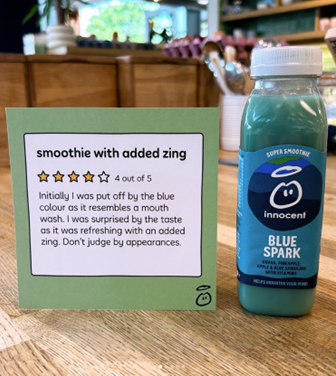
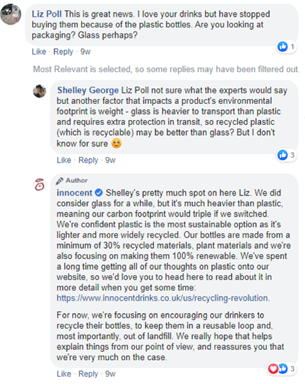
Innocent Smoothies are known for having their personable and funny marketing tone-of-voice. They incorporate reviews into their content and use social listening to actively address negative reviews or comments.
Oat milk brand Oatly have taken step further to respond to negativity and criticism.
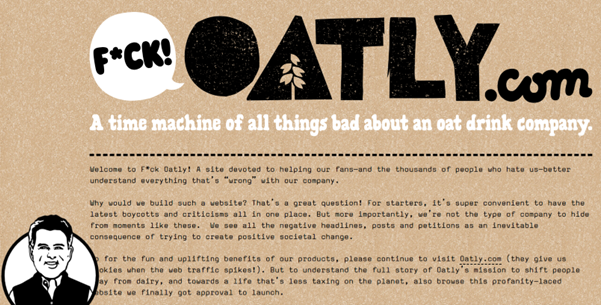
Their designated ‘f*ck Oatly’ website showcases their commitment to tackling the negativity head on. The title of the website is in-line with Oatly’s irreverent tone-of-voice. It’s simplicity and humour enable them to keep their brand focus on their product and sustainability issues whilst turning customers into true brand advocates.
Both brands have a unique approach to reviews which showcases their commitment to listening to their customers, but in a memorable way.
Can Reviews be Trusted?
Positive reviews can be a goldmine for brands. On Amazon, a 1-star increase on a listing can increase sales by as much as 26%. But wherever there is a financial upside there will always be bad actors looking to profit. According to one fraud-detection service, 42% of 720 million Amazon reviews in 2020 were fake. The prevalence of fake reviews threatens to undermine trust in the system and decrease the value of genuine successful customer-business relationships.
Review scores are also suffering from ‘grade inflation’. On some marketplaces, the majority of products have review scores falling within the range of from 4.5 to 4.8, meaning that consumers struggle to differentiate meaningfully between products.
In Conclusion: How Best to Use Reviews
Reviews have become ubiquitous through the purchase journey, with their powerful trust-building effect leading to them spreading to all corners of the internet. However, as consumers it is important to remember that not all reviews are real, and as a brand it is crucial to remember that not all reviews are equally persuasive.
Brands like Innocent and Oatly have shown a creative approach to dealing with bad reviews but not all brands need an overhaul of their marketing strategies.
From an SEO perspective, brands can incorporate reviews into their on-site content with:
- Dedicated reviews sections
- Highlighted testimonials on product pages
- Visual cues with ratings and badges near product listings
From a PPC perspective, brands can test:
- Review extensions
- Positive quotes and social proof language such as “customer favourite” in ad copy
- Campaigns created around customer success stories
As a brand, your approach to reviews doesn’t need to be groundbreaking, but it is important to remember to use them wherever you can to build trust throughout the research stage and ultimately convert new customers.
Interested in learning more?
ROAST are hosting ‘Shaping The Future: The Messy Middle for Insurance in 2024’ on 18 January 2024 at our Soho, London office.
With the latest Google update of The Messy Middle 2.0, we all want to know more about marketing in the ‘Messy Middle’. Join ROAST, Kitty and our industry professionals, to delve into how the Insurance industry is affected by this Google update, and how to make proactive marketing decisions based on the findings.



